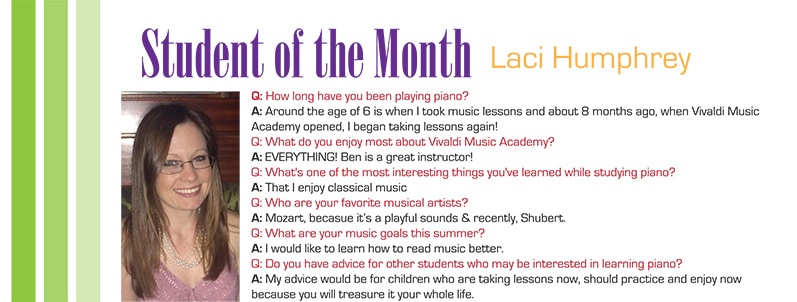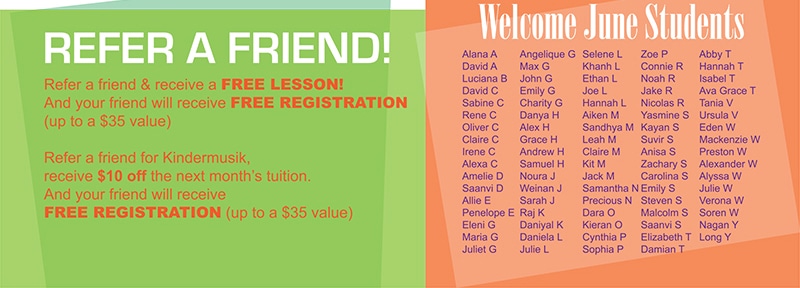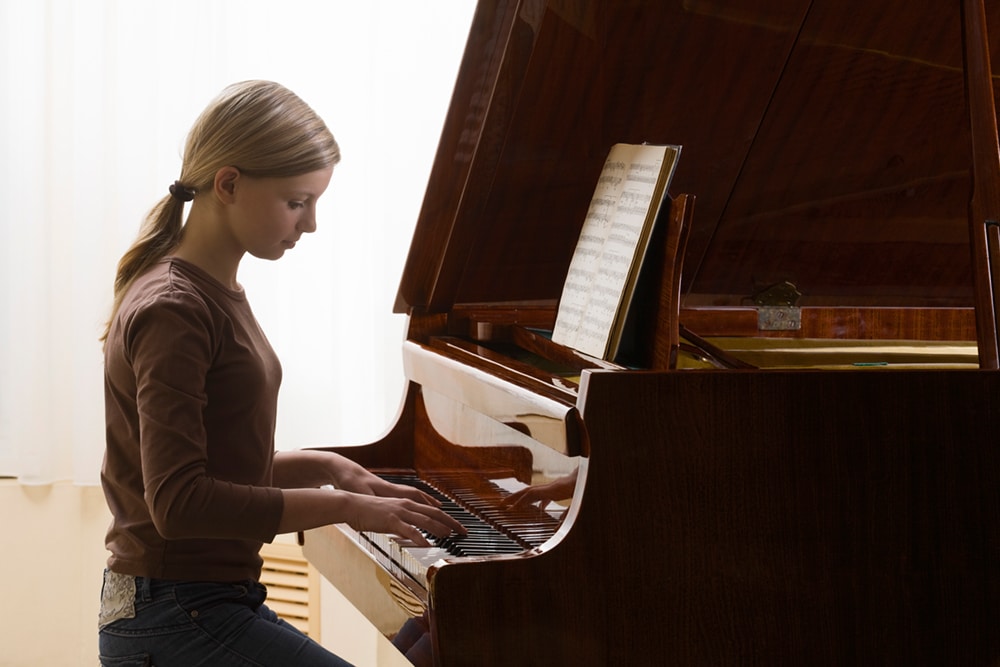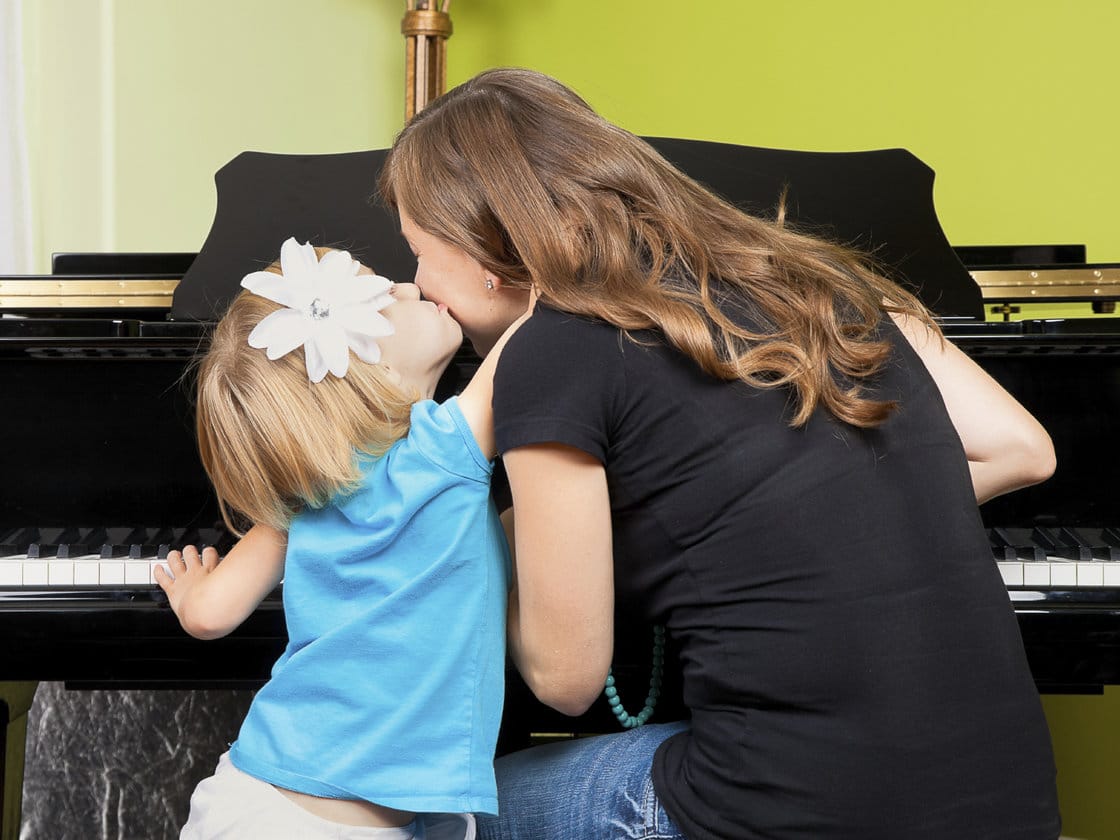In honor of Independence Day, the Academy will be closed from Friday July 4th to Thursday July 10th.
Classes and lessons will resume Friday July 11th. Have a safe and happy holiday!


In honor of Independence Day, the Academy will be closed from Friday July 4th to Thursday July 10th.
Classes and lessons will resume Friday July 11th. Have a safe and happy holiday!
Vivaldi Music Academy will receive its official award on Monday, July 21st at 11 am as the “2014 National Music School of the Year” among a field of over 100 private music school competitors. President of Music Academy Success Marty Fort, from South Carolina, will be presenting the award and spending the day with us at the Academy. All students and faculty are invited to attend the award ceremony with refreshments to follow.


Vivaldi Music Academy will be performing at the Houston Family Magazine’s Family Fun Fest at Discovery Green. If you are interested in participating in a band or ensemble, or performing an individual piece, please let the front desk know ASAP! Stage time begins at 2 pm. This is a free event for families from 12-4 pm so come out and join us!

Julia Engel is a soprano from Minneapolis, Minnesota and received her Bachelor of Music in 2009 from the University of Minnesota. While at the University of Minnesota Ms. Engel studied voice with soprano Jean del Santo, and had the opportunity to perform as a dancer in Seven Deadly Sins, Suor Dolcina in Suor Angelica, Karolka in Jenůfa (in English), and Königen der Nacht in Die Zauberflöte. Ms. Engel received her Master of Music degree in May of 2012 at the University of Houston, where she performed Louise in La Vie Parisienne (in English), her second Königin der Nacht (in English), Madame Herz in Der Schauspieldirektor (in English), Nannetta in Falstaff, and Sophie in Der Rosenkavalier.
During the fall of 2012 Ms. Engel was a part of HGOco Opera to Go! and traveled all over TX singing in their production of Hansel and Gretel as the Mother, Dew Fairy, and Witch. 2013 roles include Zerlina, Musetta* (The CoOperative Program), Olympia (Opera Theater of Pittsburgh), Nannetta, and Norina (Opera in the Heights). In 2014 Ms. Engel will sing with the Virtuosi Orchestra of Houston for their Thirteenth Annual Legends of the Future Gala Concert and Dinner, a concert of arias with the Minnesota Philharmonic, the role of Ismene in W.A. Mozart’s Mitridate re di Ponto for Metamorphosis Opera Theater, and cover Zerbinetta in Kingwood Summer Opera’s production of Ariadne auf Naxos.
Ms. Engel has placed in a number of competitions over the years, most recently receiving 2nd place in the 2014 Young Texas Artists Competition in Conroe, Texas. Ms. Engel is currently studying with soprano Cynthia Clayton.



Written by: Marc Rosenberg
There are many different types of guitars, each with their own unique sound, qualities, and capabilities. Choosing the right one for you or your child depends on what your or your child’s goals are. Here are some helpful guidelines for choosing the right axe for you.
Classical guitars: Classical guitars are acoustic instruments with nylon strings. They are mostly used for playing classical music and Latin American styles (that’s not to say that pop songs won’t sound good on nylon strings). However, I often recommend them for young beginners because the nylon strings are easier and less painful to press down.
Acoustic guitars: Acoustic guitars use steel strings and are the more commonly used acoustic guitars in pop and rock music. The steel strings allow for a brighter and louder sound compared to classical guitars. The steel strings are less forgiving than the nylon strings (harder to press down and buzz a lot more), but after a little bit of time and practice, callouses and finger strength build up enough to where there should be no problems playing the steel strings.
Electric guitars: Electric guitars are used in just about every sub-genre of pop/rock music. From heavy metal, to blues, to jazz, the electric guitar is capable of many diverse sounds. The strings used, though made out of metals as well (usually nickel or steel), are still more forgiving than steel string acoustic guitars. Single coil pickups produce a brighter, warmer sound often used in blues and pop music. Humbucker pickups create a louder, darker tone that’s used more in heavier rock music and metal.
The size of the guitar is also an important factor to contemplate when shopping. Here is a general guideline for sizes:
Some children are taller than others. And so even though this general guideline can be helpful, the best way to gauge the size of the guitar is to actually play on it if possible.

by Melanie Spanswick
Music and music lessons bring us all so much happiness – it really is very central to our lives. It is important to be given the chance to make music because it can give us an emotional and creative outlet.
Playing an instrument is an excellent source of pleasure and fulfilment and can provide a deep sense of satisfaction.
The piano provides both melody and harmony, therefore it can be played solo without any accompaniment.
It is possible to make coherent sounds on the piano from the very beginning because it has ready-made pitches (you depress a key and it makes a sound) unlike other instruments where it can take many months of study before a pleasant sound is produced.
Mastering the piano through piano lessons requires a tremendous amount of coordination (you really do have to multi-task!) so this can cultivate many useful mental skills. It really focuses the mind.
Children and adults who take part in musical activities are happier and more sociable than those who don’t.
The study of music is an extension of the learning process so children who excel at piano playing and take piano lessons often do well at school too.
Playing the piano provides a ready-made opportunity to perform. Performing is so important for everybody. If practiced regularly, it builds confidence – which, as we all know, is crucial for success in all walks of life.
Learning the piano can develop a passion and an interest in life.
It’s fun!
Learn more about our Piano teachers, our Piano Lessons, or contact us today to inquire about piano lessons at our Houston location.

by: Anastasia Tsioulcas npr.org
http://www.npr.org/blogs/deceptivecadence/2012/06/18/155282938/how-do-you-encourage-your-kid-without-being-a-crazy-stage-parent
What’s the line between nurturing a kid’s innate love of music and morphing into the classical music version of a mom on Toddlers and Tiaras?
The potential for parental overdrive lurks in every extracurricular activity. You don’t need to go any further than your local T-ball or soccer field on any given Saturday morning to see that. But when it comes to making music, and maybe even classical music in particular, it feels like the level of competitiveness can rise even higher. (Thanks again, Amy Chua!) Some From the Top families have lived in those trenches — and emerged with good advice.
Flutist Barbara Nakazawa, the mother of a From the Top alumnus cellist named Joshua Nakazawa, suggests an alternative to nagging. She recommends applying doses of positive peer pressure. “Have your child enroll in a chamber music class,” she says. “It’s true that band and orchestra are fun and social, but with chamber music, you have to really know your individual part and listen to the other players.” It’s important not just to tell your child to practice but also to nurture and monitor learning and growing. “With chamber music,” Nakazawa says, “they will not want to let the group down — and they will prepare their part. It is most important to let them find pleasure and magic in music. Chamber music is that magic.”
16-year-old From the Top pianist Hilda Huang says that some of the best kind of familial support isn’t necessarily the obvious kind, like helping to finance lessons and instruments or shuttling kids to rehearsals. “Parents are best as cheerleaders and, of course, as loving parents,” Huang says. “But some support, like the not-so-obvious things like providing quiet during practice, is always nice and comforting.” However, Hilda offers a note of caution as well. “Often, parents who are musicians themselves can get too caught up in their child’s musical development,” she says. “Living vicariously never did people too much good.”
The other side of the coin is when parents don’t play an instrument or sing themselves, but still want to be an active presence. Maybe then it’s about sharing recorded music you love (in any genre), or going to concerts to learn more together; in the Suzuki model, parents are actually encouraged to learn the instrument along with the child.
In either case, it’s important to focus attention on the kid’s experience, and their perceptions about playing music. “What my children did with their musical talent and abilities was not aboutme,” stresses Judy Merritt, mother of bassist and From the Top alum Edward Merritt. “It was about me understanding them, accepting them and providing support for them and their own musical journeys. No musical talent is ever wasted — it may just not take the form we want it to take for the child. And I as a parent had to be okay with that.” So how do you help the child see making music as a great creative outlet rather than as fuel in an (imaginary) ascent to the top? Judy Merritt has some wisdom that elevates performance from feats of rote muscle memory to a higher plane.
“My two very different musically gifted children have taught me that if the child feels the emotional expression, then playing and practicing will be about learning and perfecting the language of the heart. Playing will have more meaning,” Merritt says. “The best musicians, whether children or adults, are the ones whose heads, hearts and bodies are all connected in musical expression.”
But what do you do when one of your children decides to step back from pursuing music as intensively as he or she once did? How do you handle the transition gracefully, particularly if your child’s sense of self has largely revolved around being a musician?
When one of her children decided to scale back from playing so much, Sarah Odhner (mother of From the Top alum violinist Ben Odhner) figured out a way of letting things wind down that reduced stress for everyone. “When one of our sons was 16,” she explains, “he gravitated to non- musical activities and really did not to practice viola. Nagging teens quickly turns toxic, so my husband and I decided to put him on a six-week plan.
“We outlined a minimal amount of practicing that we expected and told him that we wouldn’t be giving him any reminders to practice. At the end of the six weeks, he had not fulfilled the minimum requirement, and he dropped the instrument.” She notes that he still loves music, but wound up with a doctorate in chemistry.